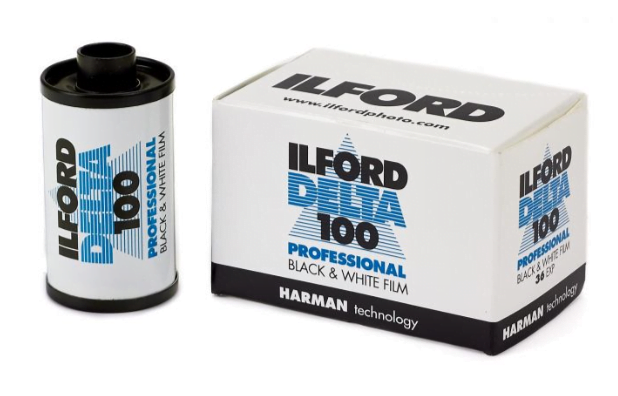Ilford’s Delta series is often lauded for its modern emulsion technology, yielding films with a fine grain and a high degree of sharpness. Among these, Delta 100 Professional sits as the low-speed option, promising meticulous detail and exceptional image quality. This review of Ilford Delta 100 dives into the film’s characteristics, juxtaposing it against other films within both the Delta range and Ilford’s traditional Plus range.

Grain Structure:
Ilford Delta 100 Professional boasts an exceedingly fine grain structure thanks to its core-shell crystal technology. The grains are tightly packed and uniform, rendering images with a smooth, almost digital quality. This fine grain is particularly appreciated in large prints where the clarity and detail of Delta 100 Professional come to the fore.
Latitude:
Delta 100 Professional offers a good exposure latitude for a low-speed film, forgiving slight underexposure without losing much in the way of shadow detail. It’s a film that provides photographers with a degree of flexibility while shooting in varying lighting conditions.
Contrast:
The contrast of Delta 100 Professional is moderate and well-balanced, rendering a wide range of tones from deep blacks through to bright whites. This balanced contrast ensures the film can perform well in a variety of lighting conditions, making it a versatile choice for many photographers.
Rendering of Grain:
The rendering of grain in Delta 100 Professional is one of its hallmark features. The grain is fine, uniform, and unobtrusive, contributing to the high-resolution and sharpness of the film. The manner in which this film renders grain can often make images appear more refined and less gritty compared to traditional grain films.
Overall Picture Quality:
The overall picture quality of Delta 100 Professional is exceptional. Images produced have a level of clarity, sharpness, and tonal richness that stands out, especially when compared to other low-speed black and white films. The film’s ability to resolve fine detail and render smooth tonal transitions makes it a preferred choice for critical work.
Comparative Analysis:
Delta Range Comparison:
Delta 100 Professional vs Delta 400: Delta 400 provides a higher speed with a coarser grain structure. While Delta 400 is well-regarded for its speed-grain ratio, Delta 100 Professional excels in rendering fine detail thanks to its finer grain.
Delta 100 Professional vs Delta 3200: Delta 3200 is a high-speed film with a much more pronounced grain. It’s suited for low-light conditions whereas Delta 100 Professional is tailored for controlled lighting or bright daylight conditions, offering much higher image fidelity.
Plus Range Comparison:
Delta 100 Professional vs FP4 Plus: FP4 Plus has a traditional grain structure and a classic look. While both films have fine grain, Delta 100 Professional tends to have a finer grain and a smoother tonal transition, attributing to a more modern look.
Conclusion:
Ilford Delta 100 Professional stands as a sterling choice for photographers seeking a low-speed film with a high degree of resolution, fine grain, and well-balanced contrast. Its modern emulsion technology sets it apart from traditional grain films, providing a sleek, refined aesthetic. When placed against other films within the Ilford lineup, Delta 100 Professional holds its ground as a film capable of delivering outstanding image quality, making it a prized option for photographers aiming for meticulous detail in their black and white imagery.